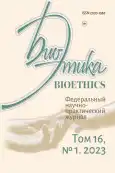Existential therapy of the Sumerian-Akkadian civilization: what the ancestral experience teaches
- Authors: Ivanov K.V.1
-
Affiliations:
- Volgograd State Medical University
- Issue: Vol 16, No 1 (2023)
- Pages: 6-11
- Section: Theoretical bioethics
- URL: https://journal-vniispk.ru/2070-1586/article/view/253772
- DOI: https://doi.org/10.19163/2070-1586-2023-16-1-6-11
- ID: 253772
Cite item
Full Text
Abstract
Therapy of existential distress of incurable patients is no less important task of palliative medicine than, in fact, relief of physical pain. At the same time, the unreliability of the means used in this field, noted by experts, forces us to pay attention to their alternative in the form of psychedelics-entheogens, whose therapeutic potential, judging by the content of world mythology, was well known to our distant ancestors. The research of this storehouse of information about the historical experience of mankind could explain a lot about the "historical amnesia" of society in relation to these substances, and perhaps change something in the current campaign for the benefit of the dying.
Aim: to investigate the reason for the prohibition of the archaic practice of using entheogens and to find out the source of modern thanatophobia on the model of the first high civilization of Sumer and Akkad in human history.
Methods: Analysis of literary sources, the historical method, a systematic approach.
Results: The role of the use of entheogens in the therapy of thanatophobia is determined. The destructive influence on the production sphere of the archaic tradition of free access to these substances within the cult, which threatened the very existence of civilization, is proved.
Conclusion: The proposed brief analysis of the well-known plot of Mesopotamian mythology "The Flight of Etana" allows us to see in it literary and artistic evidence of the effectiveness of the archaic tradition of using entheogens as a means of thanatophobia therapy. At the same time, the contradictory nature of the influence of this practice on the spiritual, psychological and socio-economic foundations of the Sumerian-Akkadian civilization is revealed, the reason for the objective-historical ban on the use of entheogens is explained, with an illustration of the existential consequences of this event for the population of the Mesopotamia.
Full Text
##article.viewOnOriginalSite##About the authors
Konstantin V. Ivanov
Volgograd State Medical University
Author for correspondence.
Email: konst.ivanoff2015@yandex.ru
senior lecturer of the Department of philosophy, bioethics and law with the course of sociology of medicine, Volgograd State Medical University, Volgograd, Russia
Russian Federation, VolgogradReferences
- Grof S. The Ultimate Journey. Consciousness and the Mystery of Death. Moscow, AST Publ., 2008. 476 p. (in Rus.).
- Grof S. Adventure of Self-Discovery. Moscow: AST, 2008. 352 p. (in Rus.).
- Ivanov K.V. The Epic of Gilgamesh as the Requiem for the Archaic. Razmyshleniya o Cheloveke: kollektivnaya monografiya = Reflections on a person: a collective monograph. N.N. Sedova, K.S. Smirnov, G.S. Tabatadze et al. Volgograd: Publishing House of VolgSMU, 2021:50–75. (in Rus.).
- Ivanov, К.V. The Huluppu Tree and its Role in History of Sumerian civilization. Razmyshleniya o Cheloveke: kollektivnaya monografiya = Reflections on a person: a collective monograph. Edited by N. N. Sedova. Volgograd, Publishing House of VolgSMU, 2019:102–114. (in Rus.).
- Blinderman C.D. Psycho-existential distress in cancer patients: a return to «entheogens». Journal of Psychopharmacology. 2016;30(12):1206.
- Ivanov K.V. The Sumerians: the Story of the Fall, or the Myth of Adapa. Razmyshleniya o Cheloveke: kollektivnaya monografiya = Reflections on a person: a collective monograph. Edited by N. N. Sedova. Volgograd, Publishing House of VolgSMU, 2020:56–69. (in Rus.).
- McKenna T. Food of the Gods. Moscow: Institute of Transpersonal Psychology Publ., 1995. 374 p. (in Rus.).
Supplementary files







